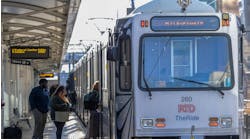AFC 2.0 to Support Faster Trips on MBTA Buses and Green Line Trains
Taking a major step toward a new system that will simplify fare collection and improve the delivery of transit services, the Massachusetts Bay Transportation Authority reached commercial and financial close with the consortium of Cubic | John Laing, executing an agreement on a multi-year contract for the design, implementation, operation, and maintenance of a new Automated Fare Collection system.
Known as AFC 2.0, the new system has a total program value for capital and operating costs of $701.3 million, which includes operating costs through 2031. The value on today’s closing was $22 million less than the amount approved by the Fiscal Management Control Board in the November award of the contract. The team has been working diligently to reach financial close to minimize exposure to interest rate movement. AFC 2.0 is moving forward under a public-private partnership model with incentives for the contractor to ensure the infrastructure is operational, with risk-sharing agreements for the financing, and requires the contractor to perform system maintenance over the thirteen-year agreement.
“As the first public-private partnership for the MBTA, this method will allow a major customer service improvement to advance in a cost-effective manner,” said MassDOT Secretary and CEO Stephanie Pollack. “The contract structure for AFC 2.0 is a crucial component of this project because it serves as a method to deliver the project, to finance it, and to free up our own internal resources to focus on other critical MBTA efforts.”
“This isn’t just the next generation of fare collection, but an entirely new way that our customers will interact with the MBTA,” said MBTA General Manager Luis Manuel Ramírez. “The new system will be compatible with all MBTA transit modes, will provide fare payment flexibility, and will have more fare media options for use. While we’re excited about today’s milestone, we will soon initiate a major effort to educate our customers, stakeholders, and partners at all levels of government on the benefits of the new system.”
Benefits of the new system include:
- Faster buses and Green Line trains: The new system will allow all-door boarding on the Green Line and on buses. With shorter lines and reduced boarding times, buses and Green Line trains will have reduced “dwell times.”
- Tap everywhere: The new system will be available on all modes starting from the initial rollout. The ability to tap and board the same way on all buses, trains, commuter rail, and ferries means customers can seamlessly transfer between modes.
- New CharlieCard: The new system includes a contactless fare card, similar to the existing CharlieCard with added security and account management benefits. New fare cards will be available at select retail locations and fare vending machines located in all subway stations and at some bus stops.
- Use of smartphone or contactless credit card: Customers can skip the step of reloading value by tapping with contactless credit cards or smartphones at fare gates and readers.
- Pay before boarding more easily: Account value can be reloaded at fare vending machines and retailers throughout the MBTA service area, as well as through the call center and a new website.
- Pay with cash: Cash payments will continue to be accepted at all vending machines and local retailers, which will be in twice as many locations as they are today. Even if customers tap with a smartphone, they will be able to reload using cash.
- Account management: Customers can check their balances, access travel history, and reload or replace a lost card online or by phone through the MBTA’s call center.
- Accessibility improvements: The entire system will be designed for a broad range of accessibility needs, by user experience specialists. All fare gates will be wider and the website and mobile app will be compliant with digital accessibility guidelines.
- Privacy protection: The privacy requirements embedded in the new system are above and beyond the industry standard to ensure that each customer’s personally identifiable information (PII) and travel history are protected.
MBTA customers will begin to experience the first elements of the new system late in 2019. During a gradual transition period, the existing CharlieCard will continue to be accepted alongside the new payment options to allow customers time to make the switch. Full implementation will occur by mid-2020, followed by a retirement of the existing system in 2021.


